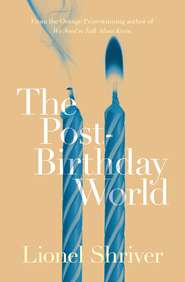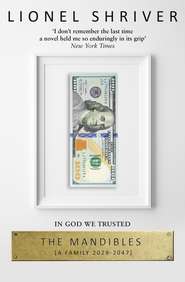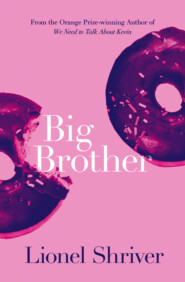По всем вопросам обращайтесь на: info@litportal.ru
(©) 2003-2024.
✖
Ordinary Decent Criminals
Автор
Год написания книги
2018
Настройки чтения
Размер шрифта
Высота строк
Поля
Those intervening weeks had been frustrating; she wanted to please him. And Farrell did have an aesthetic, even if he wouldn’t dirty his hands with carpet swatches. Whitewells and all that travel had refined him beyond Glengormley—he bought only the best in clothes, gadgets, presents when he remembered (with Constance, once). While the Best Of habit was lazy, the application of an easy rule that spared him individual decisions, inevitably he’d become rather starchy. No help, Farrell had less taste than distaste: he recognized what he didn’t want. Had a Unionist streak in him, Farrell did.
When they next went to London, then, between setting up his interviews, she scuttled into the Museum Shop at the Tate. She turned her mind off entirely and just went by feel, flipping the racks of prints, art by Braille. What she unrolled back at the hotel surprised her.
For had anyone asked before the Tate how Farrell’s preferences in art might run, she’d surely have answered the Futurists, full of tumult and flight; the nightmares of Surrealists, trapped in their own heads as he in his—contorted Dalís, absurd Magrittes; or dour Brueghels. She might have made a case for the Middle Ages, with the flat agony of those pigments, the gory, long-suffering crucifixions in which he’d recognize his own face, the plain, self-denying, racked penitence and flesh effacement of his childhood. Or perhaps, recognizing his stodgy side, she’d have said nothing modern—only classics, Da Vincis and Michelangelos, name brands, the way he bought everything, the Best. But none of these presentiments described what she spread on the bed that night.
Women. Not conflicted character portraits, either, but young, even virginal things, with red cheeks and languid fingers. Simple women, with water. Soft women—Whistler’s The Little White Girl; seaside Seurat; Degas. Shapely, sway-hipped Tissots, splayed nineteenth-century picnics by a pool, languid bites into apples with a demitasse, bustles curved at a pleasure-boat rail. Inshaw’s The Badminton Game, long hair in breeze, shuttlecock midair. April Love, the Lady of Shalott. Round women, drowsy women, beautiful women. And while some were dolorous—Matisse; Ophelia—the girls were never angry or scheming, filled with nothing so demanding as desire. No, these were guileless women, tender, and probably even stupid, not that he would value their stupidity, but what he would want from them had nothing to do with talk. Farrell might slop through every rank backroom in Belfast, but Farrell’s women were innocent.
When she hung the prints late one night and waited for Farrell to walk in the office that morning, Constance jittered, only pretending to scan papers as he strode pensively from one painting to the next, all nicely framed. He said nothing. He studied each one a long time. He went to his own office and shut the door. He’d not mentioned them then or since, but neither did he insist they come down. And just as she knew to choose them, Constance knew not to bring them up. She was not hurt; he was, a little. The paintings were an intrusion. By accident or instinct she had found his neighborhood. Whistler’s Little White Girl stuck to the wall by his desk like a pin on a map.
Having phoned until midnight the night before, Constance knew it was ridiculous to feel injured. So he hadn’t rung himself, wouldn’t he see her the next morning? At the office she was unusually efficient—which is to say immeasurably efficient, frightening, perfect—and, as Farrell swept in and out, a little cold. As evening drew he ducked in the loo and reappeared, face washed, hair combed, tie freshly knotted, and smelling of cologne, his kerchief perking from his pocket. With no mention of Oscar’s, he kissed Constance officiously on the forehead and tripped, yes, ran, practically danced down the front stairs. Constance sat at her desk and typed an address. She didn’t cry or confide on the phone or go on a bout of irrational cleaning. She finished the letter and locked up, relieved to be such a practical person.
Estrin could not remember when she had last actually planned ahead of time what to wear to dinner. She picked the black silk blouse with a thin strip of Bedouin embroidery, pleased that no one could tell from the outside it was her favorite shirt. Otherwise it was back to full leathers, to remain thick-skinned.
How often had she thrown on anything hurriedly without even bothering to check her reflection, already annoyed at having agreed to go, already waiting for the meal to be over? It had been a bad, dry fall, and as such seasons will, it eclipsed all others, as if she’d only known evenings that rose with a bottle of wine, and fell as she finally looked across the table: he was smitten; she was bored.
Yet tonight Estrin did check the mirror, with despair. Ideally she saw herself as a tall Russian heroine, unpredictable and desperate, hollowed and harrowing, with high cheekbones and wide, lethal eyes. The real Estrin was consumptive. The real Estrin wore heavy hooded cloaks, under which she clutched a snickersnee; she had just done something dreadful. Estrin had read a lot of Dostoevsky when she was fifteen.
Instead, she was short. Her cheeks were round, her features even; if Tolstoy was correct, that a truly beautiful face always had something wrong with it, then Estrin was merely a pretty girl. And girl was the word, embarrassing at her age. The only aspect of her Russian heroine she sustained was the eyes: they crouched. They both took you in and threw you out. Estrin recognized that with satisfaction.
Otherwise there was a sweetness to her face she had tried to live down for years. No matter what she suffered, her face showed no trace of it. When she studied photos of Marla Hanson, the New York fashion model attacked by her landlord with a razor, the slash scars made Estrin envious. How much more fascinating Marla would look later, with the pencil of tragedy down her nose. Estrin looked nice. Of a full busload of passengers, Estrin was the one old ladies shook down for change. Panhandlers marked her from blocks away, crossing the street for her quarters; in India, “Baksheesh” could have been her name. And so long as she rode with an open visor, nowhere was this plaguesome Rebecca-of-Sunnybrook-Farmishness more apparent than at checkpoints.
That’s right, even in Newry and Crossmaglen, when they were stopping every goddamned car, license, computer check, boot search, all soldiers ever did to Estrin was wave. Witness: Teeming the Guzzi to the city gates toward Bedford Street, Estrin slowed long enough for them to see that yes, that back compartment could pack enough Semtex to blow that new shopping center sky-high. But no. Three smiles and a “Happy Christmas.”
Banking around City Hall, a banquet of a building whose Beaux Arts façade now blinked with reindeer, Estrin noted the BELFAST SAYS NO banner had been amended. The DoE had told the City Council it could not post such a patently Unionist response to the Anglo-Irish Agreement on public property. So the Prods had soldered on an extra section of sign: -EL. Estrin laughed. She loved this fucking town.
“You look beautiful.”
Estrin felt a wild compulsion to comb her hair.
As he took her jacket and asked for a back table, Farrell displayed that curiously grave quality which characterized all his minor moments; he attended forward neatly from the waist and ushered Estrin before him with precision, even delicacy. He was a formal man, deft and considerate in all the ways that didn’t really matter—he would hold your chair out, pick up your napkin when you dropped it, pour your wine, and next week fail to show up altogether.
The gravity fell away as he began to chat about the assassination of George Seawright, when he became entirely light-hearted.
“Creepface!” recognized the waitress. “And here’s another one! Don’t I see him every week with one more lovely lass in tears.”
Farrell glared.
“You’ll pardon, but Mr. O’Phelan must be seated on the wall, eyes on all the windows and doors, isn’t that right, love? Usually the lady’s seat, but none seems to mind. Sure, she gets a handsome view whichever way she’s facing!” She patted Farrell’s cheek and delivered their menus.
“How lucky, Maire, we were seated in your section.”
“Och, I asked, love, I switched! Like following Coronation Street and earning your keep at the same time.”
She brought a bottle of Pouilly Fuissé without Farrell’s asking. “Sure we can skip the charade of having you taste it,” she announced, trickling Estrin’s glass halfway and glugging Farrell’s to the top. “Never known you to send a bottle back if it was turned enough to dress your salad. Now, should I bring the second right away, or would you like to wait and order it? A nice ceremony that, but as for the third, it’s just from the case in the icebox. You’ll have to hold your horses.”
Estrin ordered seafood. She always ordered seafood. It was a rule; fish was light. Estrin ran courses like track. She followed precepts, and not because she wasn’t a sensualist, but because she was and therefore couldn’t be trusted. In Estrin’s personal mythology, should she ever be set loose in a stocked kitchen to do as she really pleased, you would find her an hour later packed incoherent with raw beef and rolling on the floor in a melee of ice cream and apple pie.
As they had both ordered exactly the same thing, Estrin asked on an odd hunch, “Do you always order fish?”
“Or chicken.”
“Dessert?”
“Never.”
“Do you have a morbid fear of fried foods?”
He laughed. “I’ve never put it quite that way, but I avoid them.”
She inclined an inch more forward. “When do you get up in the morning?”
“Seven. Exactly.”
“Sundays, too,” she filled in. “And go to bed?”
“When I am finished. Ideally before seven. Not always.”
“When did you get up as a child? Say, twelve, thirteen?”
It was wonderful. His eyes whetted. “Five.”
She nodded victoriously. “But when did you go to school?”
“Not until 7:30. Why?”
“It was still dark,” said Estrin. “No one else was up. The house was yours. Most of the time you worked, read, wrote. But some mornings you got up only to think. For hours, watching the light gray out the windows. The birds here are exotic. And you still believed in God.”
“Did you, at thirteen?”
“No, by then I was a violent agnostic. But my father was a minister, so that speeded things up. My most remarkable precocity was early disaffection.”
“I meant, get up at five?”
“Naturally,” she dismissed. “But I’m not finished. Exercise?”
His face clouded. “I don’t have time now. I used to run—”
“All weather. All winter. Rain. In fact, you liked it when it rained. Other people were agog, when secretly the problem is keeping cool. The mizzle felt good on your face.”
Farrell did look amused. “And how far did I go?”
She licked her lips. “Ten miles. Every day.”
He laughed. “Only eight, and every odd. Still, you’re very good!”
“I’m very like you.”
The eyes unexpectedly brambled. “You know,” he said, attacking his lettuce with no dressing at all, “I think it’s time we had an ordinary conversation.”











